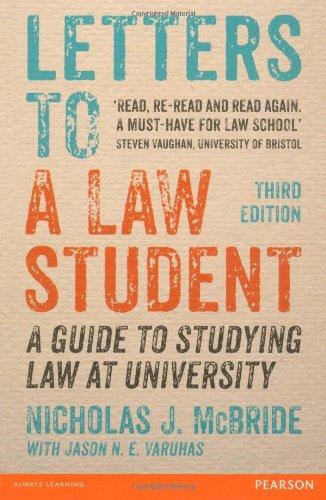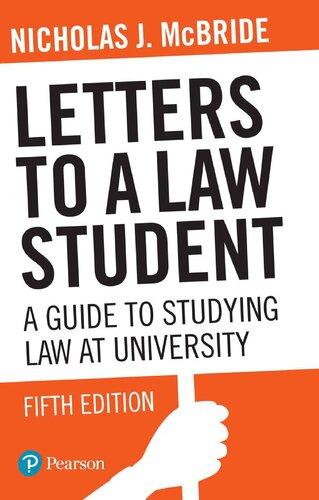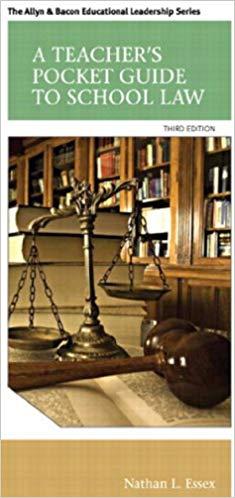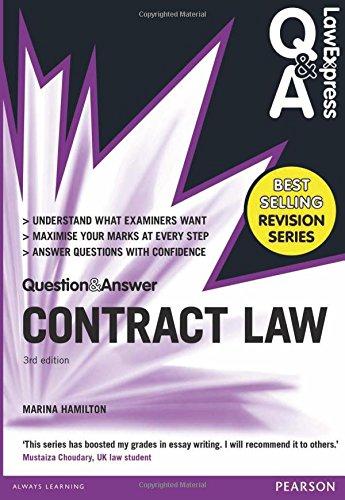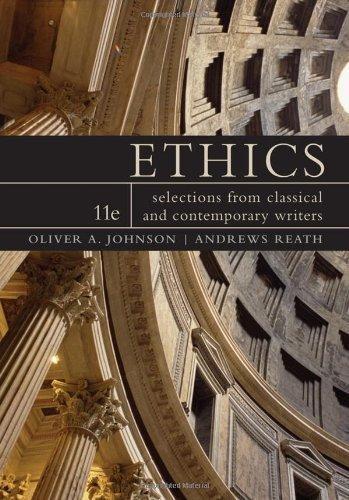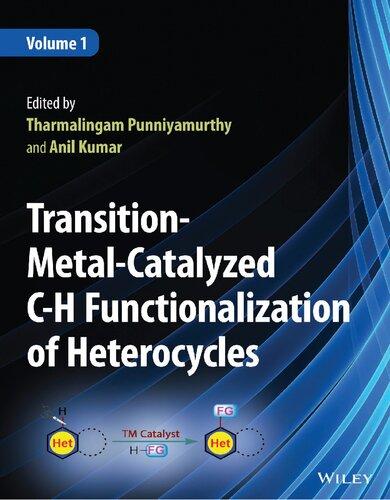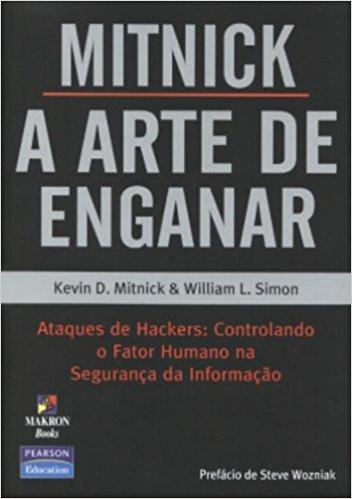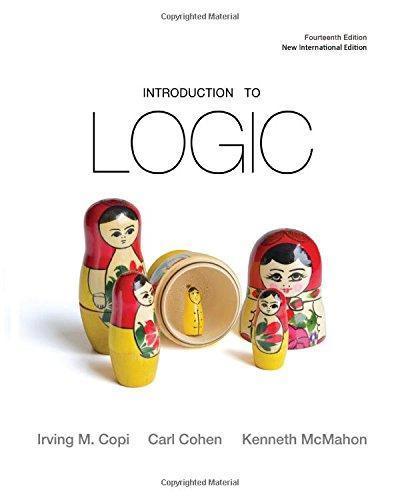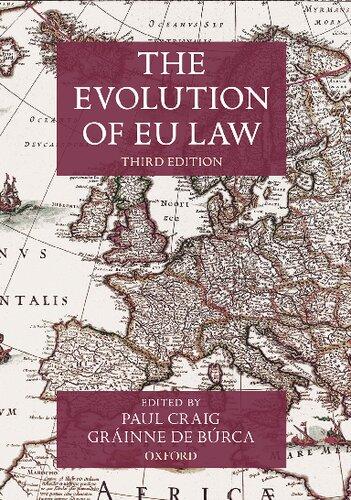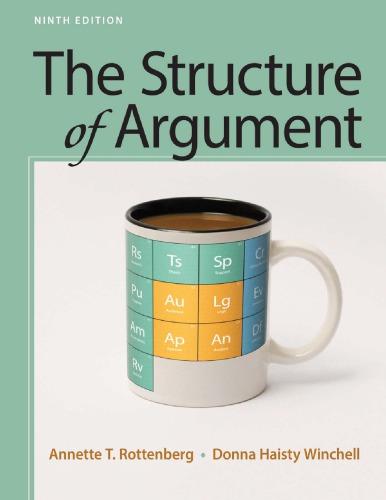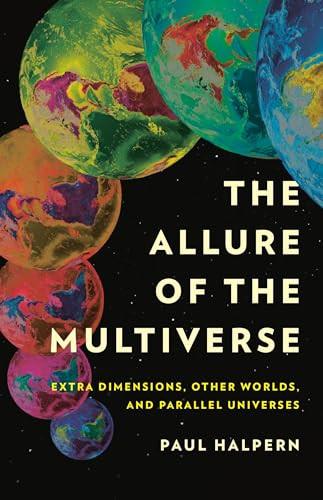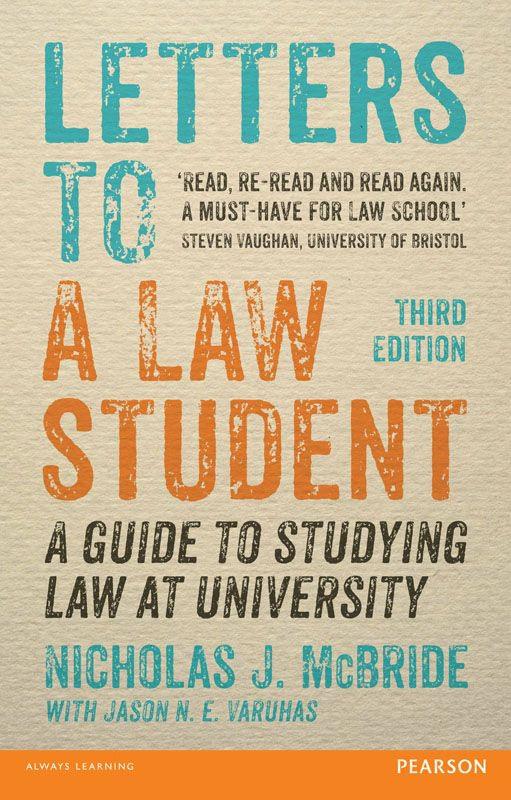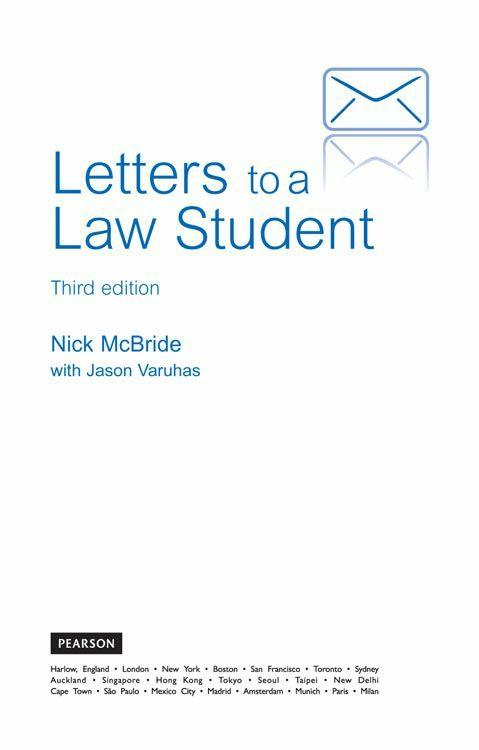LetterstoaLawStudent:AGuidetoStudyingLaw atUniversity3rdEditionNicholasJMcbride
https://ebookmass.com/product/letters-to-a-law-student-aguide-to-studying-law-at-university-3rd-edition-nicholas-jmcbride/
Instant digital products (PDF, ePub, MOBI) ready for you
Download now and discover formats that fit your needs...
Letters to a Law Student 5th Edition Nicholas Mcbride
https://ebookmass.com/product/letters-to-a-law-student-5th-editionnicholas-mcbride/
ebookmass.com
(eTextbook PDF) for Teacher’s Pocket Guide to School Law, A 3rd Edition
https://ebookmass.com/product/etextbook-pdf-for-teachers-pocket-guideto-school-law-a-3rd-edition/
ebookmass.com
Contract Law (Q&A Revision Guide) 3rd Edition Marina Hamilton
https://ebookmass.com/product/contract-law-qa-revision-guide-3rdedition-marina-hamilton/
ebookmass.com
Ethics: Selections from Classical and Contemporary Writers 11th Edition
https://ebookmass.com/product/ethics-selections-from-classical-andcontemporary-writers-11th-edition/
ebookmass.com
Transition-Metal-Catalyzed C-H Functionalization of Heterocycles Punniyamurthy T.
https://ebookmass.com/product/transition-metal-catalyzed-c-hfunctionalization-of-heterocycles-punniyamurthy-t/
ebookmass.com
A
Arte de Enganar 1ª Edition Kevin Mitnick
https://ebookmass.com/product/a-arte-de-enganar-1a-edition-kevinmitnick/
ebookmass.com
Introduction to Logic 14th Edition
https://ebookmass.com/product/introduction-to-logic-14th-edition/
ebookmass.com
The Evolution of EU Law 3rd Edition Paul Craig (Editor)
https://ebookmass.com/product/the-evolution-of-eu-law-3rd-editionpaul-craig-editor/
ebookmass.com
The Structure of Argument 9th Edition Annette T. Rottenberg
https://ebookmass.com/product/the-structure-of-argument-9th-editionannette-t-rottenberg/
ebookmass.com
The Allure of the Multiverse: Extra Dimensions, Other Worlds, and Parallel Universes Paul Halpern
https://ebookmass.com/product/the-allure-of-the-multiverse-extradimensions-other-worlds-and-parallel-universes-paul-halpern/
ebookmass.com
Tableof Contents Preface
Acknowledgements
PART1ThinkingAboutStudyingLaw
Letter1WhatIsLaw?
Letter2Four Reasonsfor StudyingLaw
Letter3WhyNotJustDoaConversionCourse?
Letter4ButIsLaw theRightSubjectfor Me?
PART2PreparingtoStudyLaw
Letter5ArguingEffectively(1): Logical Arguments
Letter6ArguingEffectively(2): SpeculativeArguments
Letter7ChoosingaUniversity
Letter8TheLNATandOther Law Tests
Letter9Tipsfor Interview
Letter10SomeTrapstoAvoid
Letter11SomeAdviceBeforeYouStartYour Studies
PART3StudyingLaw
Letter12TheChallengesAhead
Letter13AMini-DictionaryofEnglishLaw
Letter14General TipsonStudyingLaw
Letter15UsingaTextbook
Letter16ReadingCases
Letter17ABriefHistoryofLaw Reporting
Letter18LookingatStatutes
Letter19ReadingArticles
Letter20UsingtheInternet
Letter21Your TeachersandYou
Letter22Your Fellow Students
Letter23MakingtheMostofYour Time
PART4PreparingforYourExams
Letter24WritingEssays
Letter25ASampleEssay
Letter26WritingaDissertation
Letter27DiscussingProblemQuestions
Letter28CopingwithStress
Letter29TipsonRevising
Letter30LastAdviceBeforetheExams
PART5MovingOn
Letter31Preparingfor What’sNext
Letter32SomeFinal WordsofAdvice
APPENDIXA A Proust Questionnaire
APPENDIXB Preface: The Tort Wars
APPENDIXC Century Insurance v Northern Ireland Road Transport Board [1942] A C 509
APPENDIXD ‘Reasons for Studying Law’– a speech delivered at Dr Challoner’s High School, on January 19, 2012
EndNotes
Index
To the magical Isabel, Ines and Luca I miss you very much, dear friends; you are my joy and my crown (Phil. 4:1)
Preface
Thisbookhasbeenwrittenfor anyonewhoisdoing,or thinkingaboutdoing,alaw degreeatuniversity.Thebookcomprisesaseriesofletterstoalaw student,Alex. Thefirstletter issenttoAlexwhileAlexisdoingA-Levelsandthinkingabout doingalaw degreeatuniversity.Thefinal letter findsAlexjustabouttograduate fromuniversity,havingdonealaw degree Thethirtylettersinbetweentrack Alex’sprogressfromschool touniversity,givingadvicetoAlexonvariousissues suchashow tostudylaw,how towritelegal essays,andhow torevisefor exams.
Alexdoesnotexist,andnoonewhoisthinkingaboutstudyinglaw or actually studyinglaw will shareall oftheconcernsthatprompttheletterstoAlexsetoutin thisbook.Someletterswill beofmorerelevancetoyouthanothers.Ifyouare consideringstudyinglaw atuniversitythenyoushouldreadchapters1–6,10,and 24togetafeel for whatlaw isaboutandwhatsortofskillsstudyinglaw will requireyoutohaveanddevelop;andchapters11–12,and14togetmoreofasense ofwhatstudyinglaw islike.Ifyouhavemadeupyour mindtostudylaw at university,andareintheprocessofmakingapplicationstostudylaw,thenchapters 1–6wouldstill beuseful asreinforcinganddeepeningyour choicetostudylaw, andchapters7–10will behighlyrelevanttoyou.Ifyouhavebeenacceptedto studylaw atuniversity,thenyoushouldstill readchapters1–2and4–6tohelpyou getreadyfor theexperienceofstudyinglaw;youshouldalsoreadchapters10–23 beforeyougotouniversity,chapters24–25and27–28inyour firstfew daysat university;andchapters26,29–32asrequired.
Oneofthethemesofthisbookisthattoremember information,itisnotenoughto readit;youhavetouseitaswell.Anyonewhoreadsletters12–30justtheonceis likelytoforgetquitequicklywhattheyhavetosayabouthow tostudylaw andhow towritewell asalawyer,andasaresulttheir studiesandtheir legal writingwill notbenefitatall fromtheadvicecontainedinthoseletters.Aiminsteadtore-read constantlyletters14–16,19,23,25and27intheearlystagesofyour legal studies, toensurethatyouareputtingthelessonsofthoselettersintopractice.Ifyoudothis, you’ll soonfindthatyou’ll never havetoreadthoselettersagaintoremember what theysay;thehabitsofstudyandwritingthattheyseektoinculcatewill have becomecompletelynatural toyou.
BecauseAlexdoesn’texist,itwasnecessarytogiveAlexanidentity–tomake certainassumptionsaboutAlex.I’veassumedthatAlexisdoinganormal threeyear law degree.SoAlexisnotdoingamixedlaw degree,suchasadegreeinLaw &Politicsor Law &Criminology;andAlexisnotdoingadegreethatinvolves
goingsomewhereontheContinentfor oneor twoyearstofindoutwhatthelaw saysover there.I’vealsoassumedthatAlexisstudyinglaw atanEnglishor Welsh university,andnotauniversityinNorthernIrelandor Scotland.
Thethirdeditionofthisbookwaswrittenagainstthebackgroundofanadmissions roundatCambridgewhereanumber ofcolleges–includingmine–thathadplenty ofapplicantsfor law foundthemselvesunabletofill thenumber ofplacestheyhad tooffer thoseapplicants.Theproblem,itseemstome,isthatweliveinasociety thatdoesverylittletohelpstudentsleaveschool withthesortofskillsthatwould makethemnaturallysuitedtostudyinglaw atuniversity.Itseemstomethatthere arenowadaysfewer andfewer studentswholeaveschool equippedwiththe abilitiestoargueproperly,tothinkrigorously,andexpressthemselvespersuasively –preciselythesortofskillsthatlaw studentsneedtohaveinorder toperformwell aslaw students.For anyonewhoisconcernedfor thefuturehealthofour country, thisisprofoundlyworrying.Iam,ofcourse,notarguingthatwhatthecountryneeds ismorelaw students,or morelawyers–thatiscertainlynotthecase.Butwewill faceaverybleakfutureifwedonotequipmanymorepeoplewiththekindsof skillsthatstudyinglaw encouragesstudentstodevelopandwhichwelookfor,and toooftenfail todiscover eveninrudimentaryform,inthoseapplyingtostudylaw atuniversity.
Ihopethethirdeditionof Letters to a Law Student will helpmakesomesmall contributiontoreversingthisdeclineinour country’sintellectual capital –atleast amongstudentswhoarethinkingofstudyinglaw,andthosewhoareactually studyinglaw.
Thereareonlyahandful ofbooksinthisworldthatareincapableofbeing improvedandthisbookisdefinitelynotoneofthem.Studentsor teacherswhohave readthisbookandhaveconstructivesuggestionsastohow itmightbechangedfor thebetter shouldn’thesitatetogetintouchwithmeatnjm33@cam.ac.uk.Iwould verymuchwelcomehearingfromyou.
NickMcBride
PembrokeCollege,Cambridge 18 March 2013
Acknowledgements
Thisbookwouldnotexistwithoutthehelpandsupportofahugenumber ofpeople andinstitutions:
Myfamily–mymother andmybrothersChris,BenandDamian.
MybestfriendIsabel;her adorablesonLuca;andher amazingdaughter Ines–the littlemaster fromwhomIhavelearnedsoverymuch.
PearsonEducation,whopublishthisbookandmytextbookontortlaw (coauthoredwithRoderickBagshaw);OwenKnight,thecommissioningeditor who workedonthisbook;Priyadharshini Dhanagopal whooversaw productionofthis book;AnneHenwoodwhoefficientlycopy-editedthebook;andKellyMiller who producedthebook’scover.
TheFellowsofPembrokeCollege,Cambridge,whosesupportandloyaltytowards mehavebeenunstinting.
TheLaw FacultyatHongKongUniversity,whichemploysmetoteachan introductorycourseonstudyinglaw andhelpedstimulateanumber ofthenew chaptersinthisedition.
JasonVaruhas,whokindlywroteChapter 26ofthisbook,onwritingadissertation.
HelenaRoy,whoinvitedmetoher school todeliver thespeechreproducedin AppendixDofthisbook.
Myacademiccolleagues,whoprovidemewithahugeamountofsupport, encouragementandadvice.Inparticular: Trevor Allan,RodBagshaw,JohnBell, Paul Davies,LusinaHo,LeeMason,JasonNeyers,JaneStapleton,SandySteel, RobStevens,Bill Swadling,JasonVaruhas,FredWilmot-Smith,andPoJenYap.
Myteachers,towhomI’ll alwaysbeindebted: Peter Birks,HughCollins,John Davies,andJohnGardner.
Mystudents,whohavealwaystaughtmemorethanIteachthem.Inparticular: HannahBill,CharlieBrearley,LeighEdgar,TomFletcher,SamKahan,Clare Kissin,AshishKumar,KyleLawson,LizLowe,HelenMackey,AnnaMidgley, AlexRobson,Gabi Rutherford,JuliaSchulman,EmilySmith,SiobhanSparkes McNamara,Peter Sugden,NatalieWilkins,MatteoYoon,andMeganYoung.
Mylittlegirl,andmywonderful father
WhatIsLaw?
From: NicholasJ. McBride [dearnick@pearson.com]
To: Brown, Alex
Subject: What
IsLaw?
DearAlex,
Thanksfor your email.Your question–WhyshouldIstudylaw atuniversity?–isa prettybigone,anddeservesaletter rather thanjustaquickemailedresponse.For whatit’sworth,myquickanswer wouldbe: Peopleshoulddoalaw degree becausestudyinglaw isinteresting,important,andeducational.Thatdoesn’t necessarilymeanthat you shoulddoalaw degree.Law isn’tfor everyone.Butasa subjectfor study,Ithinkit’stoughtofindanother thatisasfascinating,as significant,andastransformativeaslaw is.So–that’sthequickanswer,butit’s goingtotakemetwoletterstogiveyouthelongversion.Tounderstandwhatisso greataboutstudyinglaw,youfirstneedtounderstandabitaboutwhatlaw is That’swhatIwill talkaboutinthisletter.I’ll thensendyouafollow-upletter explainingwhystudyinglaw atuniversityissomethingyoushouldgiveserious considerationto.
Lawasaconversation
Thequestionof‘Whatislaw?’isonethatcontinuestovexphilosophers.Butwe mightbeabletomaketheconceptoflaw moreunderstandablethroughthe followinganalogy.SupposethatyouandIandawholebunchofother people decidethatwearegoingtogoonholidaytogether.Weall likeeachother,andwe likespendingtimewitheachother,andaholidayisagreatopportunitytodomore ofthat.So–we’regoingonholiday,butwestill havetodecidewheretogo,when togo,wheretostay,whattodo,how wearegoingtogetthere,how mucheveryone isgoingtocontributetothecostoftheholiday,whoisgoingtobeinchargeof what.Loadsofthings.Toworkouttheanswerstothesequestions, we need to talk to each other.Therearesomeissuesthatall ofusmayhavetotalkabouttogether, suchaswherewearegoingtogoandwhen.Thereareother issues(suchas transportationandaccommodation) thatwemightbeabletodelegatetoafew
membersofour party–andtheywill workthoseissuesouttogether andreport backtous.Buthowever thevariousissuesarisingoutofour plantogoonholiday areresolved,resolvingthemwill requirelotsandlotsof conversations.
WhatIwanttosuggestisthatwecandraw ananalogybetweenthenotionoflaw andtheprocessoftalkingtoeachother inorder todecideonthedetailsofthe holidayweareall goingtogoon.Insteadoftalkingtoeachother todeterminewhat sortofholidayweshouldgoon,our law-makerstalktoeachother todetermine what sort of society we should live in.Sowhenwesay‘Whatdoesthelaw sayon suchandsuchanissue?’,wearereallyasking,‘Whereareour law-makersatthe momentintheir conversationaboutwhatsortofsocietyweshouldlivein?Have theydecidedthisissuealready?Iftheyhave,whatdidtheydecideandisthereany possibilityofthisissuebeingre-opened?Iftheyhaven’t,thenwhatdoesthestateof conversationindicateatthemomentabouthow our law-makersmightresolvethis issue?’Theconversationisongoingandintergenerational.Thefactthataprevious generationoflaw-makersmayhavetakenaparticular positiononwhatsortof societyweshouldliveindoesnotmeanthatfuturegenerationscannottakea differentposition,therebybringingaboutachangeinthelaw.However,theviews ofpreviousgenerationsoflaw-makersdonotdiewiththelaw-makers;therecord ofthoseviewslivesonandhasthepotential toinfluencetheviewsofthecurrent generation.Sogreatlaw-makersofthepastsuchasSir EdwardCoke(1552–1634), LordMansfield(1705–1793),LordShaftesbury(1801–1885),andLordDenning (1899–1999) continuetohaveavoiceintheconversationsthatgoontodayamong our law-makersastowhatsortofsocietyweshouldlivein.
Thoseconversationsareconductedamongandbetweentwoclassesoflaw-maker: judges and legislators.Judgesdecideconcrete cases, tellingthepartiestoeach casewhatthelaw saysinthatparticular case.Legislatorslaydowngeneral rulesin theformof statutory provisions, bothfor people’sguidanceastohow theyshould behaveandinorder toempower peopletoactinsociallyproductiveways.Both judgesandlegislatorsareengagedindeterminingwhatsortofsocietyweshould livein,andinperformingtheir functionseachgiveeffecttovisionsofwhatsortof societyweshouldlivein.Law thatemergesfromthewayjudgesdecideconcrete casesisknownas common law.Law thatislaiddownbylegislatorsisknownas statute law.
Theultimatepower todecidewhatsortofsocietyweshouldliveinrestswiththe legislators: indecidingcases,thejudgesmustgiveeffecttoanyrelevantlegislative provisionsthathavebeenvalidlylaiddownbythelegislators.Judgesaresubject toafurther constraintthatlegislatorsarenot.Indecidingacase,ajudgeisrequired togiveeffect,nottohisor her own personal visionofwhatsortofsocietywe shouldlivein,buttothevisionthatseemstobesupportedbythewaythe
conversationamonglaw-makersonthisissuehasevolvedsofar For example,in R (on the application of Nicklinson) v Ministry of Justice (2012),amanwhowas completelyparalysedandwishednolonger tolivesoughtadeclarationfromthe courtsthatitwouldbelawful for adoctor tokill him.Thejudgeswhodecidedthe casemayhave personally thoughtthatweshouldliveinasocietywherethissortof thingisallowedtobedone.However,therewasabsolutelynosupportfor theidea thatweshouldliveinasocietythatpractiseseuthanasiaeither instatutory provisionscreatedbylegislatorsor casespreviouslydecidedbythejudges.Sothe ideathateuthanasiaisacceptableisnotonethathadsofar foundanysupportinthe evolvingconversationbetweenlaw-makersastowhatsortofsocietyweshould livein.Giventhis,thecourtin Nicklinson hadnooptionbuttoturndownthe application,rulingthatitcouldnotholdthateuthanasiawaslawful until legislation hadbeenpassedmakingitlawful.
Therequirementthatjudgesnotgiveeffecttotheir ownpersonal viewsastowhat sortofsocietyweshouldlivein,butrather theemergingconsensusamonglawmakersonthisissueisasalutaryone–however frustratingaparticular judge(for example,onewhobelievesstronglyintheacceptabilityofeuthanasia) mightfindit. Thequestionofwhatsortofsocietyweshouldliveinisaverylargeanddifficult one,andnoonejudge(or,indeed,anyhumanbeing) canclaimamonopolyof wisdomonthissubject.Giventhis,awisejudgewill listenwithrespecttothe viewsofother law-makers–bothpastandpresent–ontheissueofwhatsortof societyweshouldlivein,andwill givegreater weighttothoseviewsthanhisown, possiblymistaken,convictionsonthisissue.Ofcourse,therearesomejudges(I couldnameafew ) whoaredeterminedtogiveeffecttotheir ownconvictions, comewhatmay–butthereexistproceduresfor marginalisingthem: their judgments canbeoverturnedonappeal,andtheytendnottogetpromotedtothehigher courts wheretheycanhavemoreinfluenceonthedirectionoftheconversationamong law-makersastowhatsortofsocietyweshouldlivein.
Aconcreteexample
Letmenow giveyouanexampletomakeclearer theideaIamadvancinghereof seeinglaw asanongoingconversationthatisaimedatdeterminingwhatsortof societyweshouldlivein.Inthe Belmarsh case, A v Secretary of State for Home Department (2004),theissuewaswhether thegovernmentwasentitledtodetain indefinitelynon-nationalswhomitsuspectedofbeinginvolvedinterrorism.(The non-nationalsweredetainedinBelmarshPrison;sothat’swhythecaseisreferred toasthe Belmarsh case,for short) Partofwhatmakesthe Belmarsh case fascinatingisthatsomanydifferent(thoughnotnecessarilyincompatible) viewsas towhatsortofsocietyweshouldliveinwererelevanttodecidingthecase.All of
theseviewshavefoundtheir placeintheongoingconversationamongour lawmakersastowhatsortofsocietyweshouldlivein.Indecidingthe Belmarsh case, theHouseofLordshadtodeterminewhichview shouldtakeprecedence.
(1) The rule of law
Thereis,first,theview thatweshouldliveinasocietythatplacesstrictcontrols onhow governmentpower isexercised,soastoensurethatitisnotexercised tyrannicallyor arbitrarily.Thisview –expressedbytheideal thatweshouldbe governed‘bylaw,andnotbymen’;inother words,thatweshouldliveunder the rule of law, andnotberuledbyarbitrarygovernmentfiat–iswonderfully expressedinboththeargumentsandjudgmentinthecaseof Entick v Carrington, whichwasdecidedwaybackin1765.Inthatcase,EnticksuedCarringtonand threeothersfor trespassingonhisland: theyhadgoneintohishouseandsearchedit for papers,inpursuanceofawarrantissuedbyaSecretaryofStatethatpurported toauthorisethemtomakesearchestofindoutwhowaspublishing‘veryseditious papersintitled The Monitor,or British Freeholder’.Entick’sbarrister argued:
Apower to issue such a warrant as this, is contrary to the genius of the law of England, and even if they had found what they searched for, they could not have justified under it … the verdict says such warrants have been granted by Secretaries of State ever since the Revolution; if they have, it is high time to put an end to them, for if they are held to be legalthe liberty of this country is at an end; it is the publishingof a libelwhich is the crime, and not the havingit locked up in a private drawer in a man’s study; but if having it in one’s custody was the crime, no power can lawfully break into a man’s house and study to search for evidence against him; this would be worse than the Spanish Inquisition; for ransackinga man’s secret drawers and boxes to come at evidence against him, is like rackinghis body to come at his secret thoughts. The warrant is to seize all the plaintiff’s books and papers without exception, and carry them before Lord Halifax; what? has a Secretary of State a right to see alla man’s private letters of correspondence, family concerns, trade and business? this would be monstrous indeed; and if it were lawful, no man could endure to live in this country
TheLordChiefJustice,LordCamden,foundinfavour ofEntick:
The great end, for which men entered into society, was to secure their property. That right is preserved sacred and incommunicable in allinstances, where it has not been taken away or abridged by some public law for the good of the whole … By the laws of England, every invasion of private property, be it ever so minute, is a trespass. No man can set his foot upon my ground without my license, but he is liable to an action If he admits the fact, he is bound to show by way of justification, that some positive law has empowered or excused him. The justification is submitted to the judges, who are to look into the books; and if such a justification can be maintained by the text of the statute law, or by the principles of common law. If no excuse can be found or produced, the silence of the books is an authority against the defendant, and the plaintiff must have judgment. Accordingto this reasoning, it is now incumbent upon the defendants to show
the law by which this seizure is warranted. If that cannot be done, it is a trespass. Papers are the owner’s goods and chattels:they are his dearest property; and are so far from enduringa seizure, that they willhardly bear an inspection … Where is the written law that gives any magistrate such a power? I can safely answer, there is none; and therefore it is too much for us without such authority to pronounce a practice legal, which would be subversive of allthe comforts of society.
Onthisview,anygovernmentpower todetainpeopleindefinitelyonsuspicionof beinginvolvedinterroristplotsislegallysuspectasitplacestoomuchpower in thehandsofthegovernmenttoactoppressivelyandarbitrarily.
(2) Necessity
Ontheother hand,thereisaview thatweshouldliveinasocietywherethe governmentisempoweredtodowhatisnecessarytoensurethesafetyandsecurity ofthepopulace.Thisview –expressedbytheLatintag salus populi suprema lex est (‘thesafetyofthepeopleisthesupremelaw’) –actuallyfindssomesupportat theendofLordCamden’sjudgmentin Entick v Carrington:
One word more for ourselves; we are no advocates for libels, allGovernments must set their faces against them, and whenever they come before us and a jury we shallset our faces against them; and if juries do not prevent them they may prove fatalto liberty, destroy Government and introduce anarchy; but tyranny is better than anarchy, and the worst Government better than none at all.
Theview thatinanemergency,thegovernmentshouldbeempoweredtoactin waysthatwouldordinarilyberegardedasoppressiveandtyrannical inorder to securepublicsafetyunderliestheCivil ContingenciesAct2004,whichpurportsto allow thegovernmentinan‘emergency’(definedasaneventor situation‘which threatensseriousdamage’either to‘humanwelfarein’,or to‘theenvironmentof’, ‘aplaceintheUnitedKingdom’) tomakeemergencyregulations‘tomake provisionfor thepurposeofpreventing,controllingor mitigatinganaspector effect oftheemergency’whenthereisanurgentneedtodoso Thisview alsounderlay thedecisionoftheHouseofLordsin Liversidge v Anderson (1944),holdingthat wheresomeonewasdetainedunder wartimeregulationsallowingtheHome Secretarytoorder theinternmentofsomeonewhomhehad‘reasonablecauseto believe[was] ofhostileoriginor associations’,thecourtswouldnotinquireinto whether there was reasonablecausetobelievethedetaineewas‘hostile’;itwould beenoughthattheHomeSecretary said therewasreasonablecausetobelievethis:
The appellant’s counseltruly say that the liberty of the subject is involved. They refer in emphatic terms to Magna Carta and the Billof Rights, and they contend that legislation dealingwith the liberty of the subject must be construed, if possible, in favour of the subject and against the Crown … I hold that the suggested rule has no relevance in dealingwith an executive measure by way of preventinga public danger.
So,onthisview,theordinaryrequirementsoftheruleoflaw –whichsuggestthat theexerciseofgovernmentpowersshouldbestrictlycontrolled–shouldbe relaxedwherethepublicsafetyisatstake.Onthisview,then,givingthe governmentpower todetainpeopleindefinitelywhentheyaresuspectedof involvementinterrorismmightnotbesoobjectionable.
(3) Democracy
Athirdview thatwasofcrucial importancetotheoutcomeofthe Belmarsh case wastheview thatinour societydifficultquestionsofhow tobalancetheneedfor securityagainsttheneedtorespectpeople’slibertiesshouldbedecidedthrough democraticinstitutionsthatcanfairlyreflectthedesiresofthemajorityastowhere thatbalanceshouldbestruck.Thisview underliesthedoctrineofParliamentary sovereignty,accordingtowhichthecourtsarenotallowedtosetasideor refuseto giveeffecttoanActofParliament.(Notethat–consistentlywiththethemeofthis letter –‘Parliament’literallymeans‘talkingshop’.) Thedoctrineof Parliamentary sovereignty isfelttobesoimportantthatwhenParliamentpassedtheHuman RightsAct1998andcommittedtheUKtobeingasocietyinwhichtheState observespeople’shumanrights,assetoutintheEuropeanConventiononHuman Rights–eventhen,Parliamenttookcaretoprovideinsection4oftheActthatthe courtswouldstill havetogiveeffecttoanActofParliamentwhichthecourts thoughtwasinconsistentwiththeEuropeanConventiononHumanRights;all they coulddoinsuchacasewasissuea‘declarationofincompatibility’andleaveitup toParliamenttodecidewhether or nottoamendtheoffendinglegislationand,ifso, how.
Therelevanceofthisthirdview totheoutcomeofthe Belmarsh caseisthat Parliamenthadlegislatedtoauthorisethedetentionofthenon-nationalswhose detentionhadgivenrisetothelitigationin Belmarsh.Under theImmigrationAct 1971,theHomeSecretaryhadapower todetainanon-national incustodywhilehe wasawaitingdeportation.Soanon-national whowassuspectedofbeinginvolved interrorismcouldbedeportedfromtheUKanddetainedincustodyunder the1971 Actwhileawaitingdeportation.Butmanynon-nationalswhoweresuspectedof beinginvolvedinterrorismcouldnotbedeportedfromtheUKastherewasareal fear thattheywouldbetorturedinthecountriestowhichtheywouldbedeported. Suchnon-nationalscouldnotbedetainedwhileawaitingdeportationunder the 1971Actbecausedeportationwasnotaprospectfor them.Section23oftheAntiterrorism,CrimeandSecurityAct2001dealtwiththisproblembyprovidingthata non-deportablenonnational whowasa‘suspectedinternational terrorist’couldstill bedetainedincustody‘whileawaitingdeportation’under theImmigrationAct 1971eventhoughinpracticeheor shecouldnever bedeported.
Theeffectiveresultofthisprovisionwastoallow thegovernmenttodetain indefinitelyincustodyanon-national whowasa‘suspectedinternational terrorist’ butwhocouldnotbedeportedfromtheUK.Increatingthispower,Parliament madeitclear thatitthoughttheneedtoensurethesecurityoftheBritishpeopleby detainingincustodynon-nationalswhoweresuspectedofbeinginvolvedterrorism outweighedanyconcernsaboutdeprivingsuchnon-nationalsoftheir liberty.Given this,how couldthecourtsjustifytakingadifferentview?
(4) Discrimination
Butthereis,fourthly,aview thatweshouldliveinasocietywherethegovernment andother importantinstitutionsarenotallowedtodiscriminateagainstpeoplefor morallyarbitraryreasons.Thisview hasonlycomparativelyrecentlyfounditsway intotheconversationamongour law-makersaboutwhatsortofsocietyweshould livein.ItfindsexpressioninLordDenningMR’sgreatjudgmentin Nagle v Feilden (1966),wheretheCourtofAppeal heldthatahorseowner couldsuethe JockeyClubfor denyingher alicencetoactasatrainer merelybecauseshewasa woman:
The common law of England has for centuries recognised that a man has a right to work at his trade or profession without beingunjustly excluded from it He is not to be shut out from it at the whim of those havingthe governance of it. If they make a rule which enables them to reject his application arbitrarily or capriciously, not reasonably, that rule is bad It is against public policy The courts willnot give effect to it Such was held in the seventeenth century in the celebrated case of the Tailors of Ipswich [1614] where they had a rule that no person was to be allowed to exercise the trade of a tailor in Ipswich unless he was admitted by them to be a sufficient workman. Lord Coke CJ held that the rule was bad, because it was “against the liberty and freedom of the subject” I have said before, and I repeat it now, that a man’s right to work at his trade or profession is just as important to him as, perhaps more important than, his rights of property Just as the courts willintervene to protect his rights of property, they willalso intervene to protect his right to work … When an association, who have the governance of a trade, take it upon themselves to license persons to take part in it, then it is at least arguable that they are not at liberty to withdraw a man’s licence – and thus put him out of business – without hearinghim. Nor can they refuse a man a licence – and thus prevent him from carryingon his business – in their uncontrolled discretion. If they reject him arbitrarily or capriciously, there is ground for thinkingthat the courts can intervene
(Notehow LordCokecanbeseenhereastalkingtoLordDenningacrossa300year interval toshapeLordDenning’svisionofwhatsortofsocietyweshouldlive in.) LordDenning’sthemewastakenupbyParliamentinpassingtheEqual PayAct 1970(requiringemployerstopaytheir employeesthesameamountfor workof equal value,regardlessoftheir sex),theSexDiscriminationAct1975(requiring employers,educationproviders,shopsandlandlordsnottodiscriminate
unjustifiablybetweenpeopleongroundsoftheir sex),andtheRaceRelationsAct 1976(banningdiscriminationongroundsofracebyemployers,education providers,shops,andlandlords).Theview thatweshouldliveinasocietywhere thegovernmentandother importantsocial institutionsdonotdiscriminateagainst peopleonmorallyarbitrarygroundshasmostrecentlybeengivenexpressioninthe EqualityAct2010,whichbringstogether manyearlier anti-discrimination provisions.ItalsounderliesArticle14oftheEuropeanConventiononHuman Rights,whichprovidesthat:
The enjoyment of the rights and freedoms set forth in this Convention shallbe secured without discrimination on any ground such as sex, race, colour, language, religion, politicalor other opinion, nationalor socialorigin, association with a nationalminority, property, birth or other status.
Therelevanceofthisview tothe Belmarsh casewasthatthepower todetain suspectedinternational terroriststhatwasunder scrutinyin Belmarsh onlyapplied tonon-nationals: thatis,peoplewhowerenotUKcitizens.SoaUKcitizencould notbedetainedindefinitelyunder s.23oftheAnti-terrorism,CrimeandSecurity Act2001evenifhewasalsoa‘suspectedinternational terrorist’.Onecan understandwhyParliamentendedupinthisposition.Ononeview,Parliamentmay havethoughtthatitwassimplypluggingaloopholeintheoriginal ImmigrationAct 1971,under whichthegovernmentcouldonlydetainsuspectedterroristswhoit wantedtodeportifdeportationwasapractical option.Asthepower todeportonly appliedtonon-nationals,Parliament’s‘fix’oftheImmigrationAct1971alsoonly appliedtonon-nationals.Onanother –morecynical –view,itmaybethat Parliamentintendedthats 23ofthe2003Actshouldoperateinadiscriminatory fashion.ParliamentmayhavethoughtthatthepeopleintheUKwouldnotputup withtheindefinitedetentionofaUKcitizenonmeresuspicionofbeingaterrorist, butmightberelativelyindifferenttosomeonewhowasnotaUKcitizensufferinga similar fate.Either way,theeffectofs.23wasthatthepower todetainsuspected terroristsindefinitelyincustodyappliedinanunacceptablydiscriminatoryfashion –itworkedagainstnon-nationalsbutnotagainstUKcitizenswhentheremighthave beennomorallysignificantdifferencebetweenthem.
The outcome of the case
ThedoctrineofParliamentarysovereigntymadeitinevitablethattheHouseof Lordswouldhavetorulethattheindefinitedetentionofnon-nationalswhowere suspectedinternational terroristswaslawful under s.23ofthe2001Act.However, theHouseofLordsalsomadeitveryclear thattheexistenceofsuchapower was repugnantto their visionofwhatsortofsocietyweshouldlivein,anddeclared thatthepower todetainindefinitelynon-nationalswhoweresuspectedof
involvementinterrorismwasincompatiblewiththeEuropeanConventionon HumanRights.LordHoffmanngavethemostoutspokenjudgment:
This is one of the most important cases which the House has had to decide in recent years. It calls into question the very existence of an ancient liberty of which this country has untilnow been very proud:freedom from arbitrary arrest and detention The power which the Home Secretary seeks to uphold is a power to detain people indefinitely without charge or trial. Nothingcould be more antitheticalto the instincts and traditions of the people of the United Kingdom
Freedom from arbitrary arrest and detention is a quintessentially British liberty, enjoyed by inhabitants of this country when most of the population of Europe could be thrown into prison at the whim of their rulers. It was incorporated into the European Convention in order to entrench the same liberty in countries which had recently been under Nazi occupation. The United Kingdom subscribed to the Convention because it set out rights which British subjects enjoyed under the common law This country, more than any other in the world, has an unbroken history of livingfor centuries under institutions and in accordance with values which show a recognisable continuity …
[A] power [to detain on suspicion of beinginvolved in terrorism] is not compatible with our constitution. The realthreat to the life of the nation, in the sense of a people livingin accordance with its traditionallaws and politicalvalues, comes not from terrorism but from laws such as these.
Thoughitwasunder noobligationtodoso,ParliamentlistenedtotheHouseof Lords’viewsandrepealeds23ofthe2001Act,replacingitwithapower under thePreventionofTerrorismAct2005toimpose‘control orders’onanindividual in order topreventor restrict‘involvementbythatindividual interrorism-related activity.’
Where we are now
The Belmarsh casewasjustoneepisodeinthegreat,centuries-longconversation betweenour law-makersaboutwhatsortofsocietyweshouldlivein.Stepping backabit,itmightbeworthgivingyouanoverview ofwhereweareatthemoment inthisconversation.Our law-makersseemtoagreeatthemomentthatweshould liveinasocietywhere…
Persons
(1) …peoplearerequiredtoobservecertainminimumstandardsofdecentconduct inthewaytheytreatother people,andwill beabletoobtaineffectiveremedies fromthecourtswhenthoseminimumstandardsarenotobserved.These requirementsandremediesaresetoutinthe law of tort.
(2) …peoplewhodeliberatelyfail toobservetheseminimumstandardsmaybe punishedbytheState.Theconditionsunder whichsuchapersonmaybeso
punishedarelaidoutinthe criminal law
(3) …peoplehavethepower tomakebindingpromises,andenter intobinding agreements,withother people,andeffectiveremedieswill beavailablefrom thecourtswhensuchbindingpromisesor agreementsarebroken.Thesepowers andremediesexistunder the law of contract.
(4) …peopleareabletorecover thevalueofmoneyor other benefitsthatthey haveconferredonother peoplebymistakeor under unacceptablepressureor in theconfidentexpectationofgettingsomethinginreturnwhichnever came.This power torecover abenefitonehasconferredonsomeoneelseexistsunder the law of restitution or the law of unjust enrichment (differentpeopleprefer differenttitlesfor thisareaoflaw).
(5) …thesortofeducationpeopleget,or wheretheywork,or wheretheylive,or whatgoodsandservicestheycanbuy,or thewaytheyaretreatedbythe governmentwill notbeaffectedbytheir gender,or their race,or their sexual orientation,or anyother morallyirrelevantcharacteristic.Provisionsensuring thatthisisthecasemakeup anti-discrimination law.
Property
(6) …peopleareabletoacquireanddisposeofproperty,andwill haveeffective powerstocontrol,retainandrecover suchpropertyafter theyhaveacquiredit andbeforetheyhavedisposedofit.Thepowerstoacquireanddisposeof property,andtocontrol,retain,andrecover itarethesubjectmatter ofthe law of property (whichareaoflaw isusuallysplitupinto land law,the law of personal property (or commercial law),and intellectual property law).
Markets
(7) …peopleareabletotradegoodsandserviceswitheachother,andareleftfree todeterminefor themselvesthetermsoftrade–atleastwheretheyareofequal bargainingpower.Thesepowerstotradewitheachother anddeterminethe termsoftrade(andthelimitsonthesepowers) arealsodealtwithbythe law of contract.
(8) …peoplearefreetocombinetogether toformcompanies,throughwhichthey cantradegoodsandservices,sharingintheprofitsmadebythecompany,while limitingtheir liabilitiesifthecompanyisunsuccessful.Thesepowersaredealt withby company law.
(9) …tradersinthemarketplacearerequirednottoconspiretogether torigtheir prices,or toabuseadominantpositionthattheyhaveacquiredinthe marketplacetodriveoutanyremainingcompetitors.Theselimitsaredealtwith by competition law.

